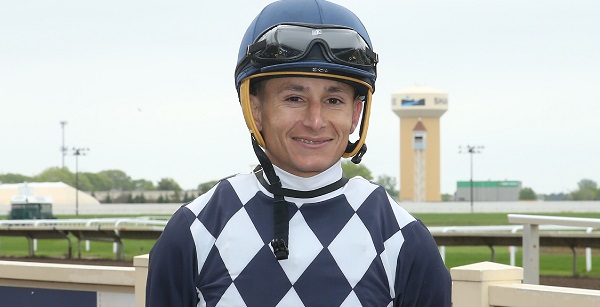BY JIM WELLS
He sends money home to his parents frequently, scrimping and saving here and there to support his wife and three daughters at the same time, all the while keeping in mind the values he guards like a strongbox, many of them learned since arriving in the United States, El Pais de Oportunidad.
Francisco Arrieta is truly an American immigrant in its iconic sense, a man looking for the opportunities that are nearly nonexistent where he came from, Venezuela.
He can’t imagine returning home, not now certainly, with the country in economic shambles, lines of hungry people standing in line for hours to procure something to eat, hospitals overcrowded, sickness abundant and basic supplies growing scarcer all the time.
Venezuela was the richest nation in Latin America during the 1990s, but has fallen into financial and social disrepair in the past few years, producing protests and unrest in a country of 32 million inhabitants.
Arrieta, who is riding for the second meet at Canterbury Park this summer, is never too busy to think about the friends and relatives he left behind, and he stays in touch, talking frequently with his parents and siblings. “It’s horrible for so many of them,” he said.
He and his immediate family _ wife Elizabeth and daughters Frangelis, Anaeily and Abigail _ occupy a travel trailer during the winter months when he rides at Turf Paradise in Phoenix, while they plan for the future, overcoming a setback here or there while staying focused on the “bigger picture.”
“You have to work hard every day and never forget that,” he said. “You have to work hard and keep your sight on the future. And you have to keep your faith in God.”
Arrieta relied on those axioms daily while winning the jockey title at Turf Paradise last winter, riding just short of 200 winners, and they are uppermost in his mind now as he leads the rider standings at Canterbury Park.
He never considered not staying in the U.S. or bringing his family here to join him, even when all sorts of bureaucratic red tape tested his resolve and that of his wife, isolated in Venezuela while he worked out details for her and the girls to join him.
Three months, then six, then nine, twelve and ultimately 18 months, one delay after another, but he stayed in touch with his wife, Elizabeth, and they worked through it, she and the girls finally joining him in New York.
He would gallop horses mornings, get what mounts he could in the afternoon and then join Elizabeth, already on the job, cleaning a large office building, a daily job that helped them survive. A local church put together funds to buy them a car. Five months later he was able to buy his own, a 1996 Toyota.
“We were working hard, every day,” he said.
Another of those axioms…hard work eventually pays off.
There are more. For Arrieta, God is the decider, but a person has to be ready to take advantage of the opportunities he plants along the way. “You work hard, but God is always in front,” he said.
Now, while they live out of their camper in Shakopee, he and Elizabeth are planning, saving and discussing the eventual purchase of a house of their own.
They are not there yet, haven’t even picked out a city.
Phoenix is a possibility. “We really like it there. It’s very nice in the winter,” Arrieta said. It’s also conducive to family life, with a meet that runs from November through April.
The Arrietas like it in Minnesota, too, during the spring and summer months. They like the social atmosphere. “We really like the, how do you say it ? ” he asked, checking for the English word on the screen of his phone. “Culture,” he was told. “Yes,” he said. “Cultura.”
“Everyone is open and talks about things,” he added. “At home I never talked about things to anyone.”
Not an issue any longer. He is friendly, engaging and just as often lets his skill aboard a racehorse speak for him.
He is quick to shake hands after an introduction with a smile every bit as swift, displaying an energy and willingness to work, no matter how tough the task.
He came north from South America, but don’t let his point of departure fool you. He might as well have crossed the pond from Europe and come through Ellis Island like so very many others.
